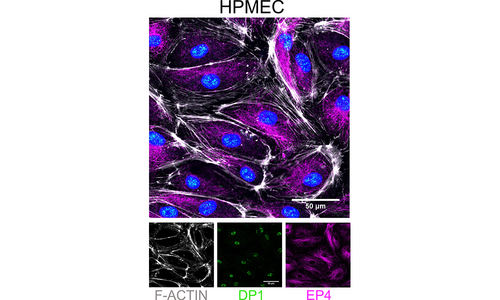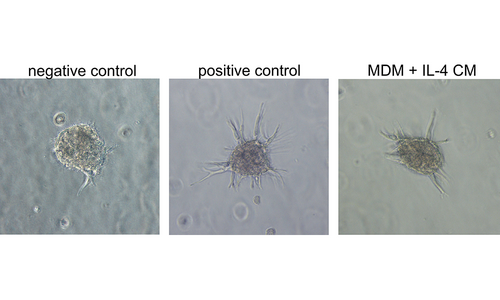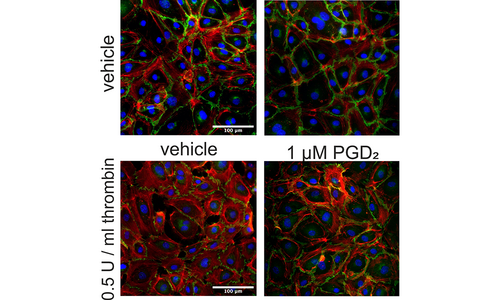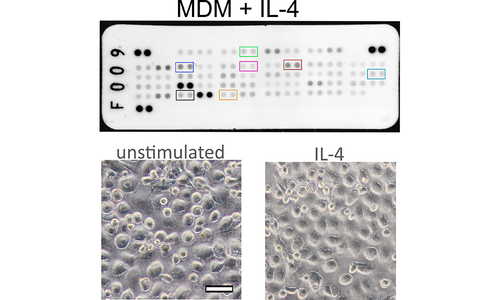-
The University
- Welcome
- Who we are
- Media & PR
- Studying
-
Research
- Profile
- Infrastructure
- Cooperations
- Services
-
Career
- Med Uni Graz as an Employer
- Educational Opportunities
- Work Environment
- Job openings
-
Diagnostics
- Patients
- Referring physicians
- Health Topics
- Health Infrastructure
Research team Heinemann
Research Focus: Chronic respiratory and pulmonary diseases
Team Leader: Akos Heinemann
Focus: Chemotactic factors, their receptors, and adhesion molecules on both leukocytes and endothelial cells in blood vessels play a crucial role in the multi-step process of leukocyte infiltration into tissues and are therefore considered promising therapeutic targets in various inflammatory conditions. Platelets also play a role in this process and can activate blood coagulation. We focus on in-depth research into the functions of leukocytes and endothelium, and their interactions, to develop new pharmacological targets and agents. For this purpose, we utilize isolated cell systems, tissue cultures, patient samples, and disease models.
Networks: The Department of Pharmacology is characterized by cross-team collaboration with the research groups of Eva Sturm, Petra Luschnig (bronchial asthma), Grazyna Kwapiszewska (pulmonary fibrosis), and Gunther Marsche (lipid metabolism). Patient samples are provided through scientific collaboration with the clinical departments of pulmonology, cardiology, nephrology, and obstetrics. There are also close partnerships with international collaborators and industry.
Projekte
Succinate as a signaling molecule in human placenta
An important aspect of placental functionality is metabolic flexibility, which allows the tissue to adapt to developmental changes and respond to stress. Disruptions in this flexibility can lead to pregnancy complications such as preeclampsia. We have demonstrated that elevated concentrations of succinate are present in the placenta of patients with gestational diabetes and that the succinate receptor is expressed in human placental endothelial cells. Therefore, in this study, we focus on elucidating the functional and mechanistic responses to succinate and the activation of its receptor in these cells. This project aims to provide new insights into the dysregulation of this signaling axis, which could represent an unexplored pathogenic mechanism in preeclampsia and gestational diabetes.
Project duration: 2025-2029
Funded by: FWF
Project team: Reham Atallah (lead), Julia Kargl, Jürgen Gindlhuber (Otto Loewi Research Center), Christian Wadsack (Department of Gynecology and Obstetrics).
Succinate as a new therapeutic target in idiopathic pulmonary fibrosis
Idiopathic pulmonary fibrosis is a chronic progressive pulmonary disease, with short median survival. During the last decade, metabolic processes have been recognised as playing a crucial role in this disease. Most research has focused on the Krebs cycle, a metabolic pathway that is crucial in providing energy as well as metabolites for further metabolic processes. This project aims to elucidate the role of succinate, an intermediate in the Krebs cycle. By using in vivo, in vitro and ex vivo approaches, we will illuminate whether this metabolite might represent a potential target in fibrotic disease.
Duration: 2021-2025
Funded by: Docfund RespImmun, FWF
Project team: Thomas Bärnthaler (lead), Rishi Rajesh, Reham Atallah, Grazyna Kwapizsewska und Leigh Marsh (Otto Loewi Research Center), Corina Madreiter-Sokolowski (Gottfried Schatz Research Center)
Altered ER and mitochondrial responses in pulmonary fibrosís
Idiopathic pulmonary fibrosis (IPF) is a devastating disease with poor prognosis and unclear etiology. Previous reports proposed that endoplasmic reticulum (ER) stress and induction of unfolded protein response in alveolar epithelial cells fuel the progression of lung fibrosis. Similarly, a role of mitochondrial dysfunction in the pathogenesis of IPF has been described. The ER and mitochondria are connected through distinct sites, so called mitochondria-associated ER membranes (MAMs). Numerous processes such as Ca2+ signaling, lipid metabolism, stress signaling, mitochondrial fission/fusion, and autophagy are regulated via MAMs. How these interconnected molecular mechanisms of altered ER and mitochondrial responses contribute to IPF onset and progression are not clear. Therefore, we aim to identify early mechanistic triggers in the ER and/or mitochondria which might play a role in the onset of IPF.
Project duration: 2024-2028
Funded by: PhD Program Molecular Medicine, Medical University of Graz
Project team: Reham Atallah (lead), Sana Zahra, Thomas Bärnthaler, Leigh Marsh, Jürgen Gindlhuber (Otto Loewi Research Center), Roland Malli (Gottfried Schatz Research Center, Core Facility Imaging).
Phenotypic Changes of Eosinophil Granulocytes in Aging
It is well-established that aging is associated with impaired immune cell function and hence, increased susceptibility to disease, a phenomenon known as immunosenescence. This effect has long been described in cells of the adaptive immune system (especially in B- and T-cells). However, there is much less data in innate immunity. Eosinophilic granulocytes are cells of the innate immune system and traditionally associated with allergic disease and defense against parasites. Their role in aging in human subjects is unclear, although there are promising data from animal experiments. This project aims to elucidate possible therapeutic targets for the treatment of immunosenescence using RNASeq, as well as functional methods in comparing eosinophils from young and aged individuals.
Duration: 2022-2026
Funded by: PhD Program Molecular Medicine, Medical University of Graz
Project team: Thomas Bärnthaler (lead), Svetlana Pahernik, Reham Atallah, Johannes Fessler (Otto Loewi Research Center), Wolfgang Schwinger (Department of Pediatric Hemato-Oncology), Dominique Thomas (Goethe University Frankfurt).
Basement membrane fragments as novel mediators of leukocyte activation
The basement membrane is pivotal in ensuring the barrier function of the endothelium. In various acute or chronic lung diseases, the basement membrane is attacked by proteases, which can lead to fragmentation and simultaneous release of bioactive fragments, so-called matrikines. This project investigates the impact of basement membrane matrikines on leukocyte function and its contribution to acute lung diseases. Through detailed pharmacological characterization, we aim to identify novel targets to modulate the function of matrikines on leukocytes.
Project duration: 2022-2024
Funded by: Start-up grant, Medical University of Graz
Project team: Katherina Jandl (lead), Grazyna Kwapizsewska and Ceren Ayse Mutgan (Otto Loewi Research Center), Malgorzata Wygrecka (Center for Infection and Genomics of the Lung, Justus Liebig University, Giessen).
The involvement of 15-prostaglandindehydrogenase in acute kidney injury
Acute kidney injury (AKI) is a very common condition with poor long-term outcomes defined as a rapid decline of kidney function. Up to now, there are no pharmacologic treatment options. Among the most frequent etiologies are nephrotoxic agents, such as non-steroidal anti-inflammatory drugs (NSAID), which act by inhibiting prostaglandin (PG) synthesis. Of note, some PGs, especially PGE2 have been shown to exert beneficial effects on kidney function. In vivo, PGE2 is rapidly metabolized via 15- prostaglandin dehydrogenase (PGDH), which is also responsible for the degradation of lipoxin A4, another nephroprotective mediator. The aim of this project is to elucidate the contribution of 15-PGDH to AKI and to establish its inhibition as a potential therapeutic strategy.
Duration: 2022-2023
Funding: Apart-Mint (ÖAW)
Project team: Thomas Bärnthaler (lead), Agnes Mooslechner, Kathrin Eller (Department of Nephrology), Marion Pollheimer (Division of Pathology), Dominique Thomas (Goethe University Frankfurt).







